
AnkiGPT
Turn lecture slides into flashcards and export them to Anki. Uses GPT-4 by OpenAI. AnkiGPT already generated 2,038,777 flashcards.
Stars: 136
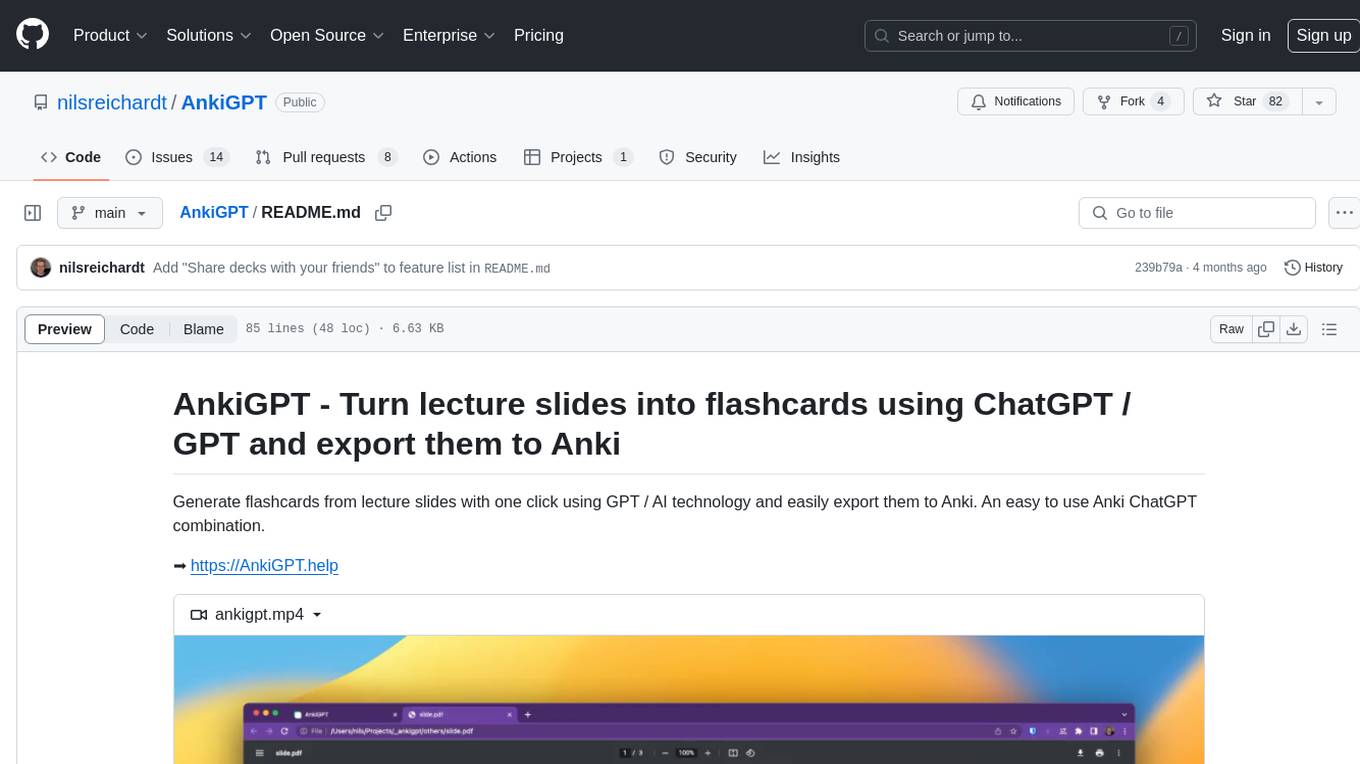
AnkiGPT is a tool that leverages GPT-3.5 or GPT-4 by OpenAI to generate flashcards from lecture slides or text input. Users can easily export the generated flashcards to Anki for effective learning. The tool allows users to edit, delete, and share flashcards, as well as generate mnemonics. AnkiGPT supports nearly all languages and ensures user privacy by not using submitted content for AI training. While powerful, the tool has limitations such as occasional errors in generated flashcards and challenges with mathematical equations. AnkiGPT is designed specifically for Anki flashcard app integration and encourages users to review and verify flashcard information for accuracy.
README:
Generate flashcards from lecture slides with one click using GPT / AI technology and easily export them to Anki. An easy to use Anki ChatGPT combination.
https://github.com/user-attachments/assets/99d7bfcb-a11b-47af-9ac4-50b92f36bed7
- 📁 Upload PDF slides or insert text
- 🧠 Generate flashcards up to 150 Anki flashcards with one click using GPT-3.5 or GPT-4 by OpenAI
- 📤 Export generated flashcards by GPT (ChatGPT) to Anki with CSV file
- ✏️ Edit flashcards, in case you want to change something
- 🗑️ Delete flashcards, in case GPT (ChatGPT) generated something wrong or useless card
- 💡 Generate mnemonics for your flashcards
- 👫 Share decks with your friends
Try it out:
- As website: https://AnkiGPT.help (recommended)
- As GPT in ChatGPT: https://chatg.pt/AnkiGPT (requires ChatGPT Plus subscription)
AnkiGPT first detects the language of the input. Then it splits the text into multiple sections and sends multiple requests to GPT (ChatGPT) model to generate flashcards with AI. The generated flashcards are then displayed in the browser and can be exported to Anki.
Yes, the source code of the client for AnkiGPT is public and can be accessed by anyone interested. You can explore or even contribute to the project by visiting the GitHub repository (nilsreichardt/ankigpt). However, it's important to note that while the client's code is open, the backend (including the prompts) is closed source. We greatly value community input and appreciate all contributions to improve AnkiGPT.
AnkiGPT is designed to be a globally accessible tool, and as such, it supports nearly all languages. This broad language coverage allows users from various linguistic backgrounds to utilize AnkiGPT effectively. However, the level of support might vary depending on the language due to complexities in language structures and available datasets. We are consistently working on improving our support for all languages to ensure the best user experience possible.
AnkiGPT primarily utilizes the GPT-3.5 by OpenAI model to generate flashcards, offering a seamless integration of advanced AI technology for effective learning. For users who opt for the AnkiGPT Plus version, they gain the enhanced capability to generate up to 150 flashcards per month using the more advanced GPT-4 model, ensuring even more sophisticated and nuanced content creation.
No, your submitted content is not used for AI training. AnkiGPT leverages GPT models from OpenAI, which have a strong commitment to user privacy. OpenAI do not use customer-submitted data via their API to train or improve their models (Source: API data usage policies). Your lecture slides content is only processed to create flashcards and is not used for any other purposes, ensuring your information remains private and secure.
As of now, AnkiGPT is designed specifically to work with the Anki flashcard app and we currently have no plans to extend support to other flashcard applications. This is to ensure the highest level of integration and functionality with Anki, thus providing an optimal user experience. We encourage users to utilize AnkiGPT with the Anki app for the best performance and reliability.
While AnkiGPT is a powerful tool, it does have a few limitations to keep in mind:
-
Firstly, remember that AI, including AnkiGPT, is not infallible. There will be occasional errors in the generated flashcards, as with any AI technology. Always review your flashcards for accuracy.
-
Secondly, GPT models, at the current stage of development, aren't particularly adept at handling mathematical equations and formulas. This might impact the quality of flashcards in these areas.
-
Lastly, for users who utilize the PDF input feature, please note that it currently only processes text. Any images, including diagrams and pictures in the PDF, will be ignored.
We're continually working on refining and expanding AnkiGPT's capabilities to improve your learning experience. Stay tuned for future updates and enhancements.
Yes, it's possible that the flashcards generated by AnkiGPT may contain inaccuracies. Even with its advanced technology, AI is not perfect and can occasionally produce errors. Therefore, AnkiGPT should be used as an assistant to your study process, not a replacement for creating your own flashcards. We recommend that users always review and cross-verify the information on the flashcards to ensure accuracy. We're continually working to improve the reliability and precision of our tool, but human oversight remains an important part of the process to guarantee quality learning outcomes.
Yes, AnkiGPT is available as a custom GPT. Custom GPTs were introduced by OpenAI in November 2023, see Introducing GPTs. Note, however, that using AnkiGPT as a GPT requires a ChatGPT Plus subscription. Otherwise, AnkiGPT as a GPT is completely free and there are no usage limits.
Advantages of using AnkiGPT as a GPT:
- Create unlimited flashcards without buying AnkiGPT Plus
- Create unlimited flashcards with GPT-4
- Create flashcards (besides the text & PDF input) from images (e.g. screenshots of lecture slides)
Disadvantages of using AnkiGPT as a GPT:
- You need a ChatGPT Plus subscription
- ChatGPT has a limited context windows, which means that GPT can only create 10 flashcards per message (you can ask for more flashcards when GPT is done)
Access AnkiGPT as GPT here: https://chatg.pt/AnkiGPT
Please note that AnkiGPT is not affiliated with Anki or OpenAI. AnkiGPT is a third-party tool that utilizes the OpenAI API (GPT / ChatGPT) to generate flashcards. AnkiGPT is not responsible for any errors or inaccuracies in the generated flashcards. We recommend that users always review and cross-verify the information on the flashcards to ensure accuracy.
For Tasks:
Click tags to check more tools for each tasksFor Jobs:
Alternative AI tools for AnkiGPT
Similar Open Source Tools

AnkiGPT
AnkiGPT is a tool that leverages GPT-3.5 or GPT-4 by OpenAI to generate flashcards from lecture slides or text input. Users can easily export the generated flashcards to Anki for effective learning. The tool allows users to edit, delete, and share flashcards, as well as generate mnemonics. AnkiGPT supports nearly all languages and ensures user privacy by not using submitted content for AI training. While powerful, the tool has limitations such as occasional errors in generated flashcards and challenges with mathematical equations. AnkiGPT is designed specifically for Anki flashcard app integration and encourages users to review and verify flashcard information for accuracy.
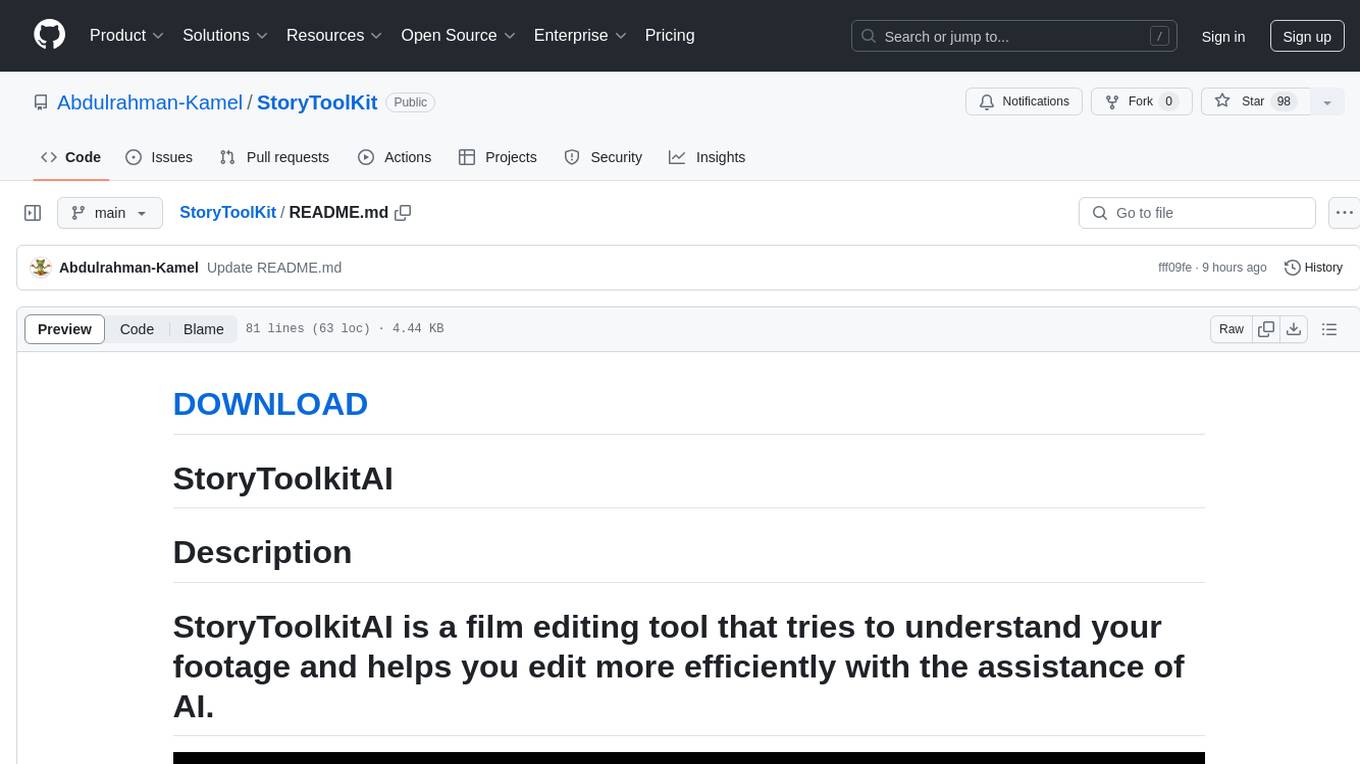
StoryToolKit
StoryToolkitAI is a film editing tool that utilizes AI to transcribe, index scenes, search through footage, and create stories. It offers features such as automatic transcription, translation, story creation, speaker detection, project file management, and more. The tool works locally on your machine and integrates with DaVinci Resolve Studio 18. It aims to streamline the editing process by leveraging AI capabilities and enhancing user efficiency.
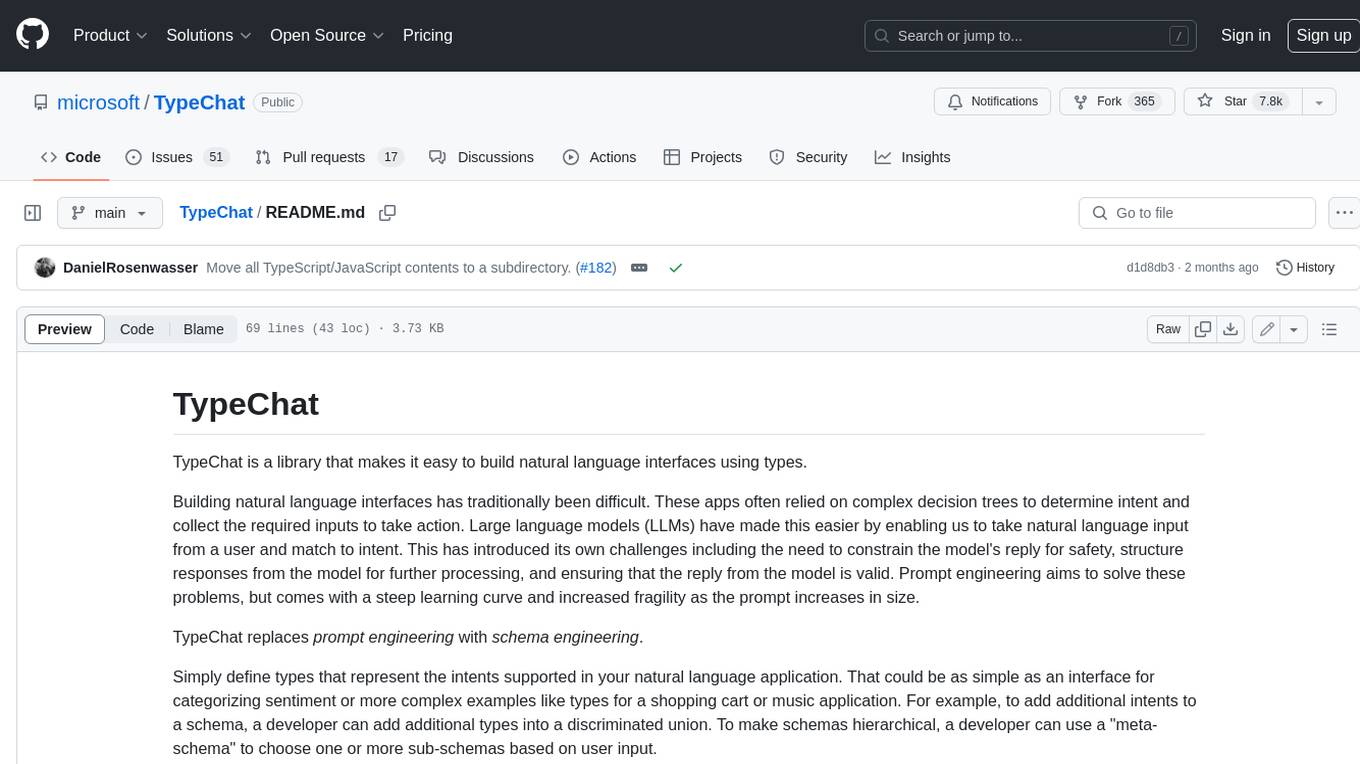
TypeChat
TypeChat is a library that simplifies the creation of natural language interfaces using types. Traditionally, building natural language interfaces has been challenging, often relying on complex decision trees to determine intent and gather necessary inputs for action. Large language models (LLMs) have simplified this process by allowing us to accept natural language input from users and match it to intent. However, this has introduced new challenges, such as the need to constrain the model's response for safety, structure responses from the model for further processing, and ensure the validity of the model's response. Prompt engineering aims to address these issues, but it comes with a steep learning curve and increased fragility as the prompt grows in size.
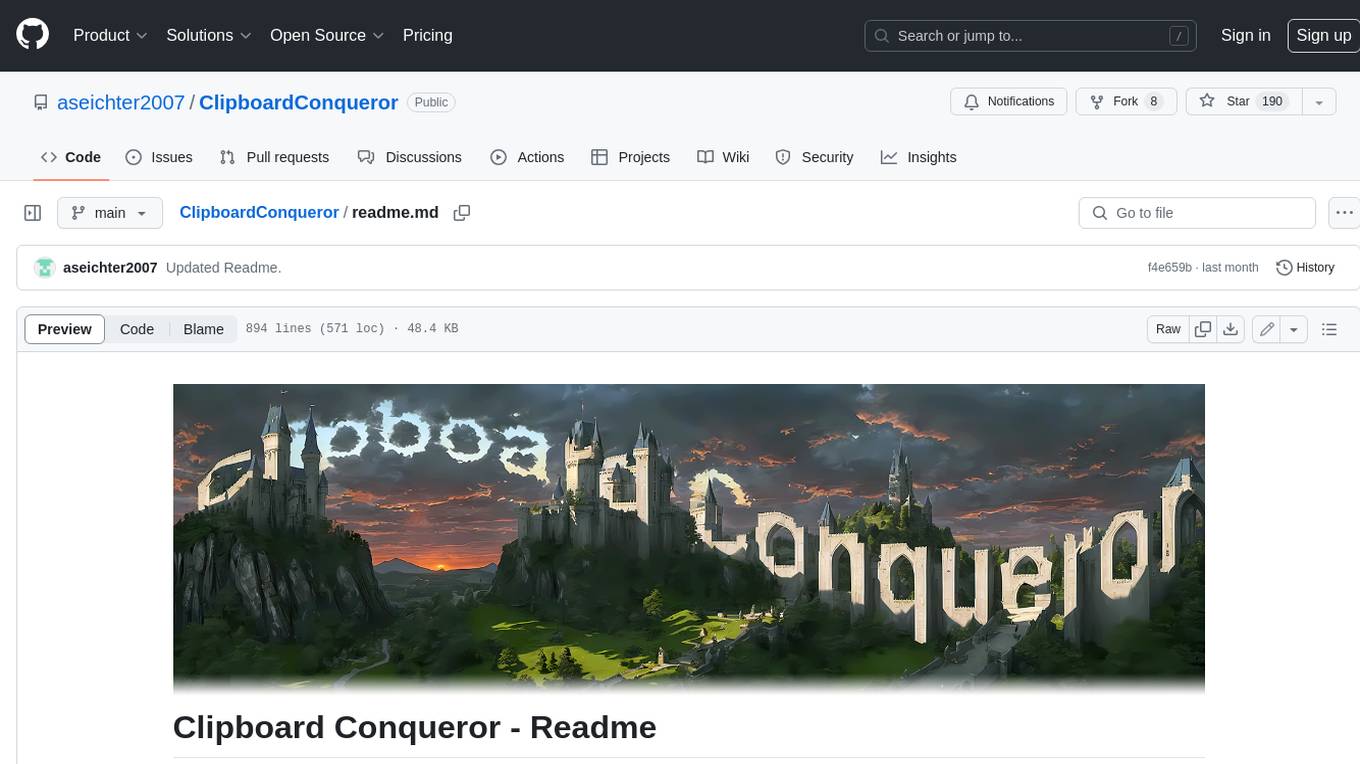
ClipboardConqueror
Clipboard Conqueror is a multi-platform omnipresent copilot alternative. Currently requiring a kobold united or openAI compatible back end, this software brings powerful LLM based tools to any text field, the universal copilot you deserve. It simply works anywhere. No need to sign in, no required key. Provided you are using local AI, CC is a data secure alternative integration provided you trust whatever backend you use. *Special thank you to the creators of KoboldAi, KoboldCPP, llamma, openAi, and the communities that made all this possible to figure out.
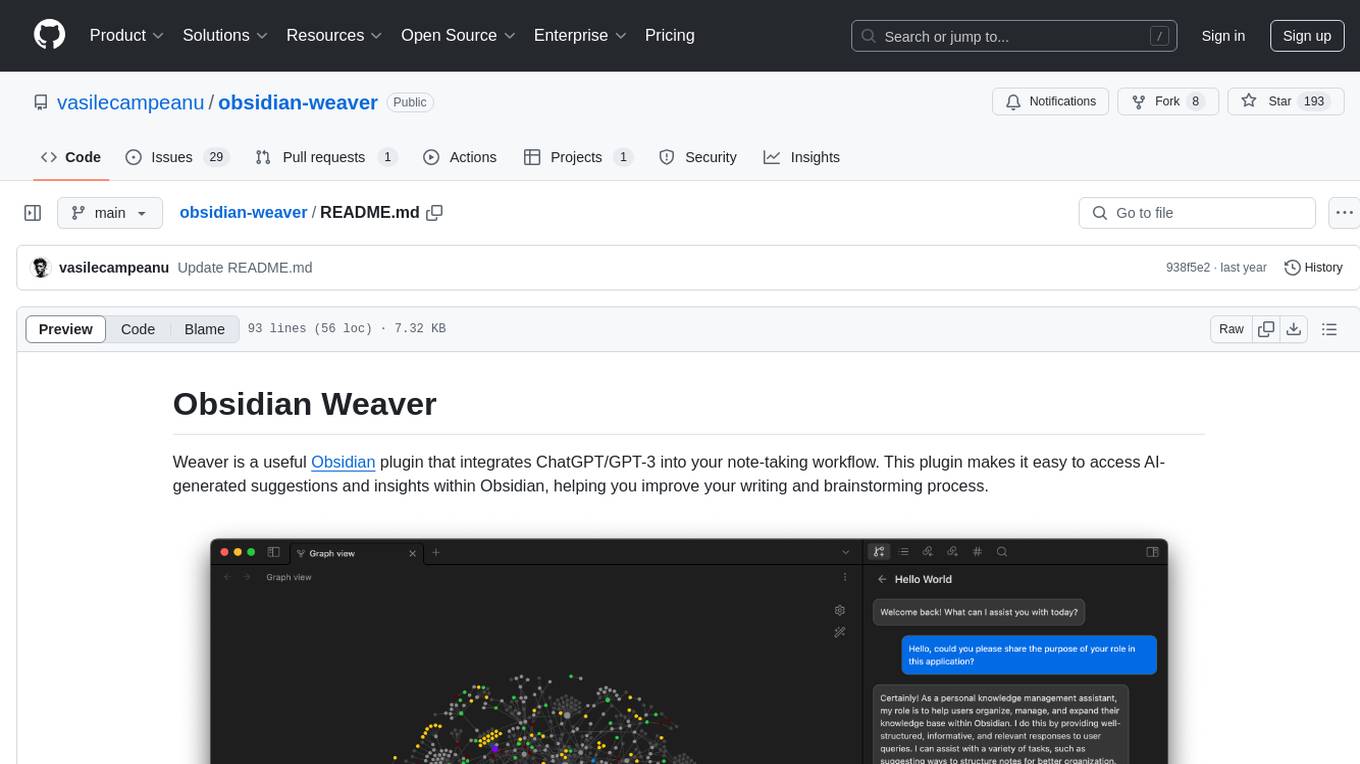
obsidian-weaver
Obsidian Weaver is a plugin that integrates ChatGPT/GPT-3 into the note-taking workflow of Obsidian. It allows users to easily access AI-generated suggestions and insights within Obsidian, enhancing the writing and brainstorming process. The plugin respects Obsidian's philosophy of storing notes locally, ensuring data security and privacy. Weaver offers features like creating new chat sessions with the AI assistant and receiving instant responses, all within the Obsidian environment. It provides a seamless integration with Obsidian's interface, making the writing process efficient and helping users stay focused. The plugin is constantly being improved with new features and updates to enhance the note-taking experience.
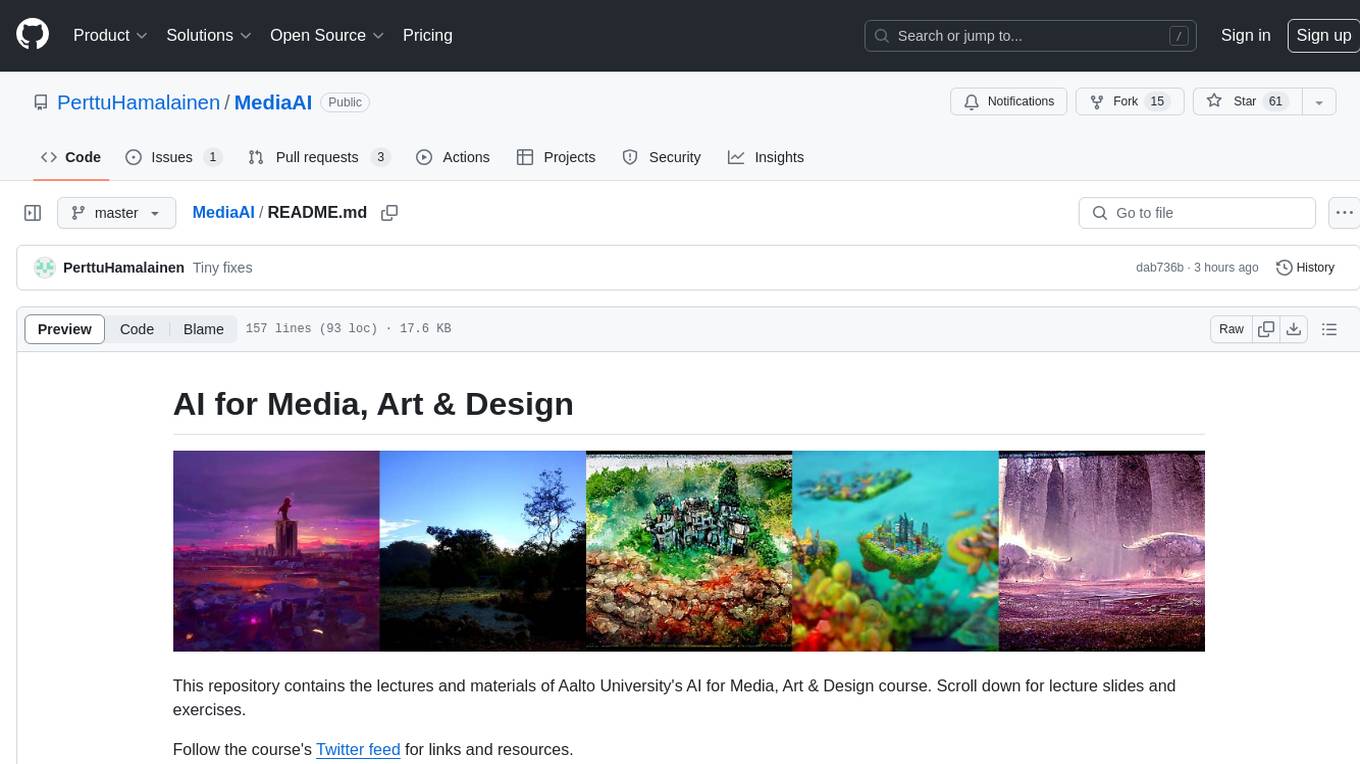
MediaAI
MediaAI is a repository containing lectures and materials for Aalto University's AI for Media, Art & Design course. The course is a hands-on, project-based crash course focusing on deep learning and AI techniques for artists and designers. It covers common AI algorithms & tools, their applications in art, media, and design, and provides hands-on practice in designing, implementing, and using these tools. The course includes lectures, exercises, and a final project based on students' interests. Students can complete the course without programming by creatively utilizing existing tools like ChatGPT and DALL-E. The course emphasizes collaboration, peer-to-peer tutoring, and project-based learning. It covers topics such as text generation, image generation, optimization, and game AI.
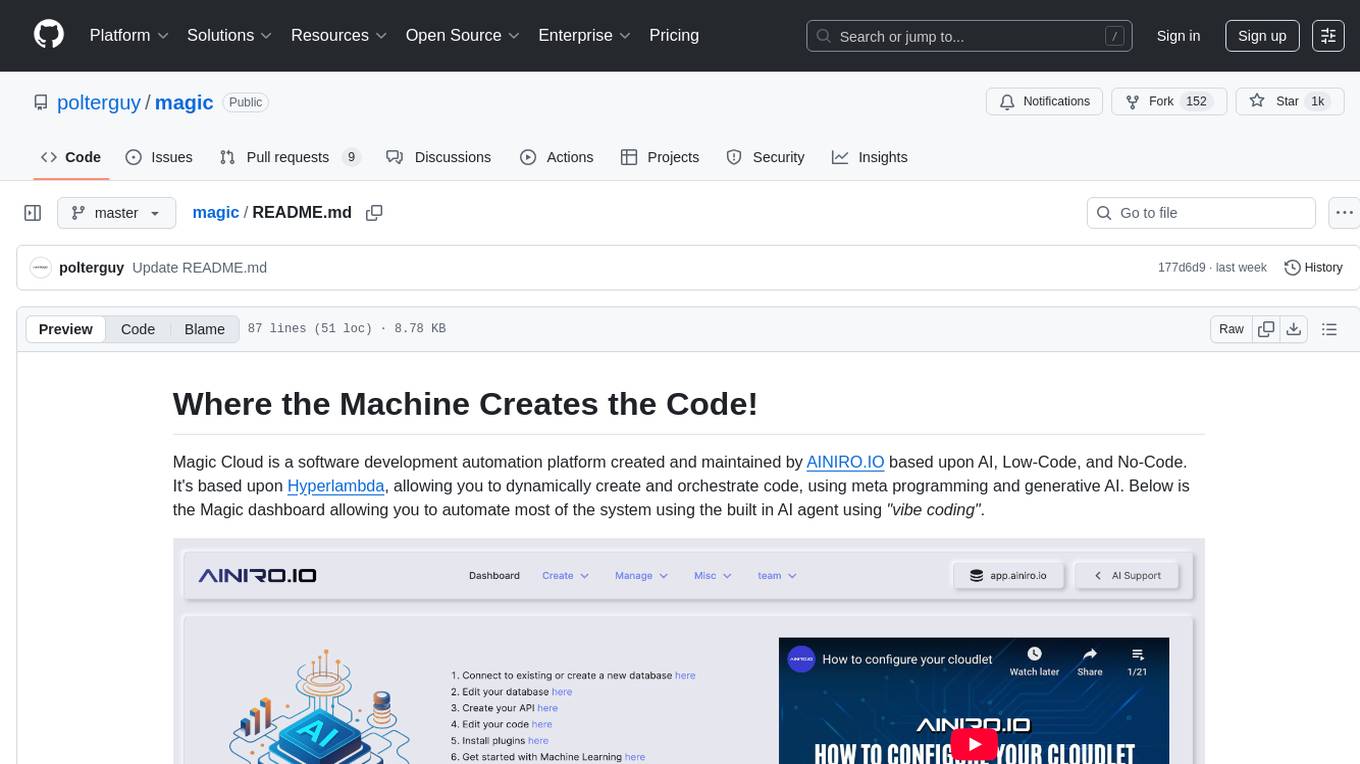
magic
Magic Cloud is a software development automation platform based on AI, Low-Code, and No-Code. It allows dynamic code creation and orchestration using Hyperlambda, generative AI, and meta programming. The platform includes features like CRUD generation, No-Code AI, Hyperlambda programming language, AI agents creation, and various components for software development. Magic is suitable for backend development, AI-related tasks, and creating AI chatbots. It offers high-level programming capabilities, productivity gains, and reduced technical debt.
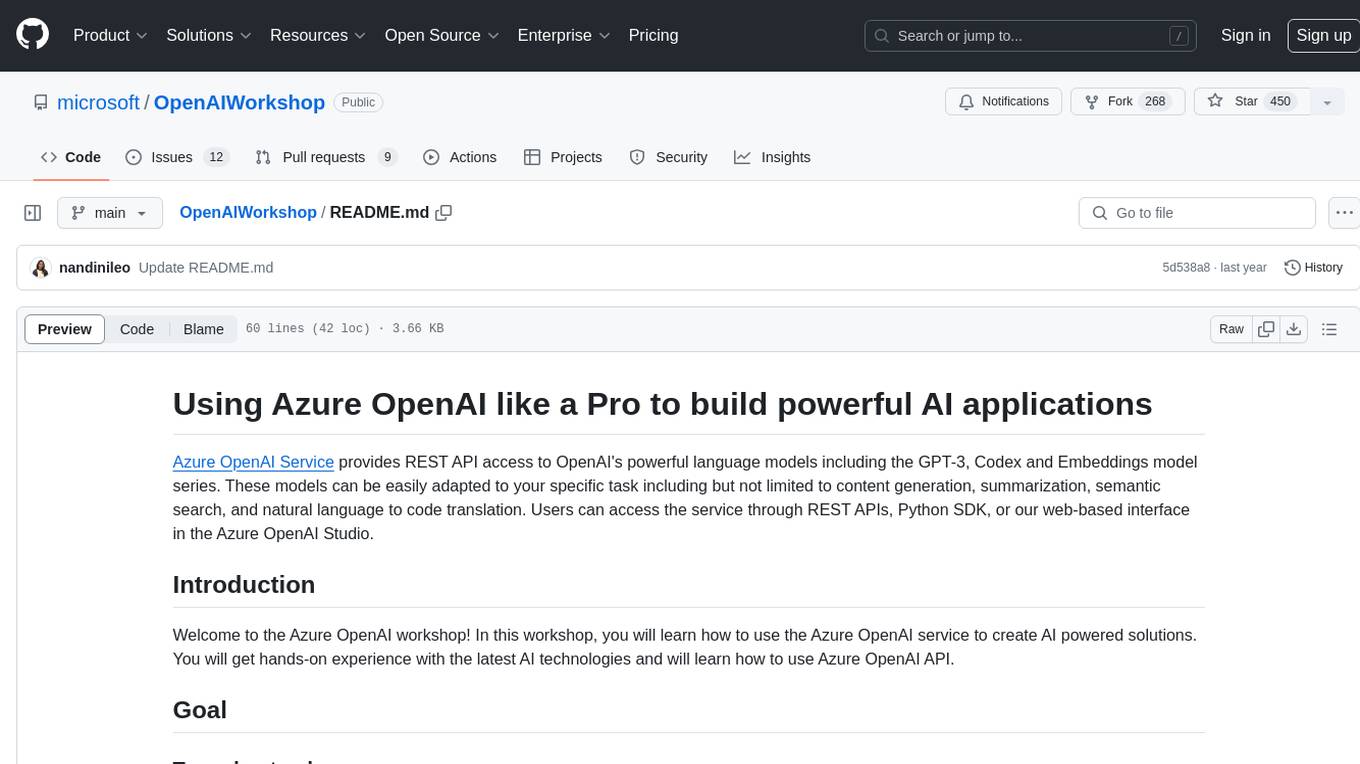
OpenAIWorkshop
Azure OpenAI Service provides REST API access to OpenAI's powerful language models including GPT-3, Codex and Embeddings. Users can easily adapt models for content generation, summarization, semantic search, and natural language to code translation. The workshop covers basics, prompt engineering, common NLP tasks, generative tasks, conversational dialog, and learning methods. It guides users to build applications with PowerApp, query SQL data, create data pipelines, and work with proprietary datasets. Target audience includes Power Users, Software Engineers, Data Scientists, and AI architects and Managers.
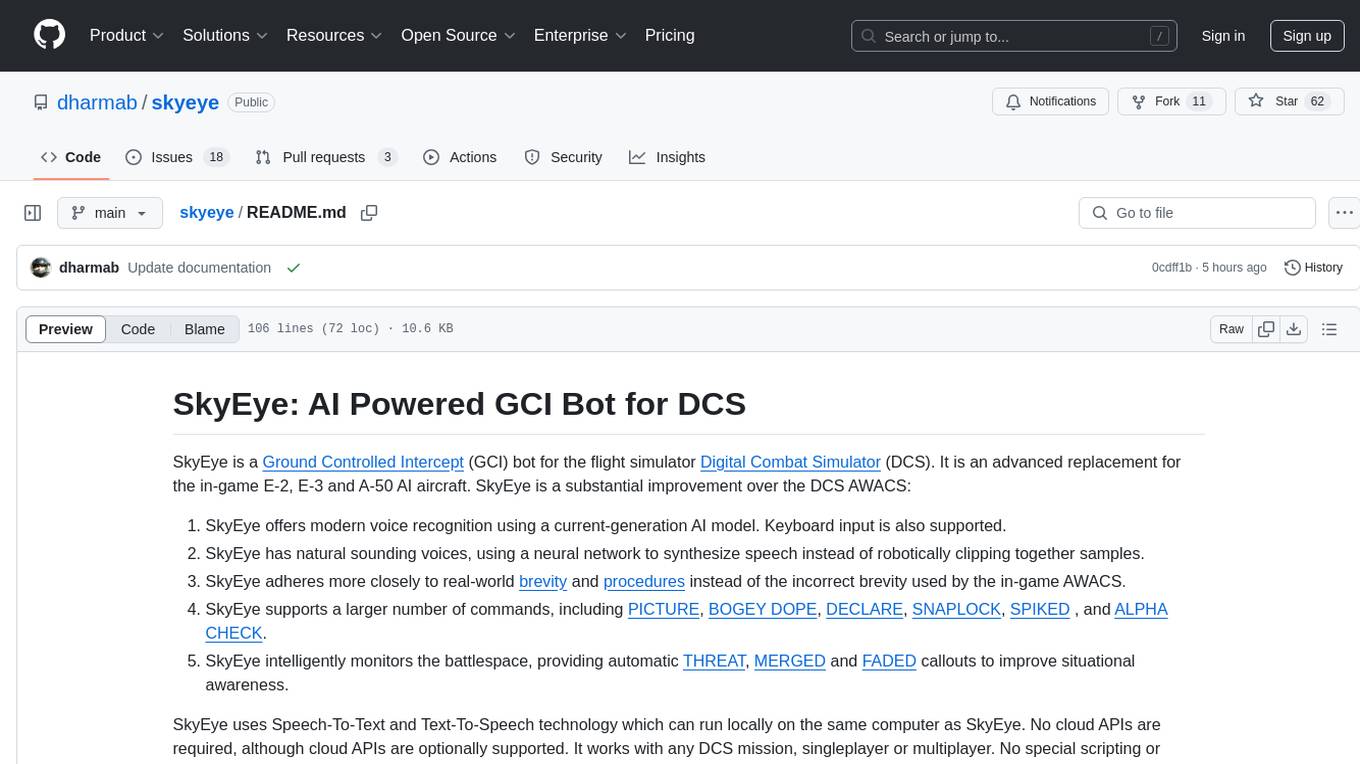
skyeye
SkyEye is an AI-powered Ground Controlled Intercept (GCI) bot designed for the flight simulator Digital Combat Simulator (DCS). It serves as an advanced replacement for the in-game E-2, E-3, and A-50 AI aircraft, offering modern voice recognition, natural-sounding voices, real-world brevity and procedures, a wide range of commands, and intelligent battlespace monitoring. The tool uses Speech-To-Text and Text-To-Speech technology, can run locally or on a cloud server, and is production-ready software used by various DCS communities.
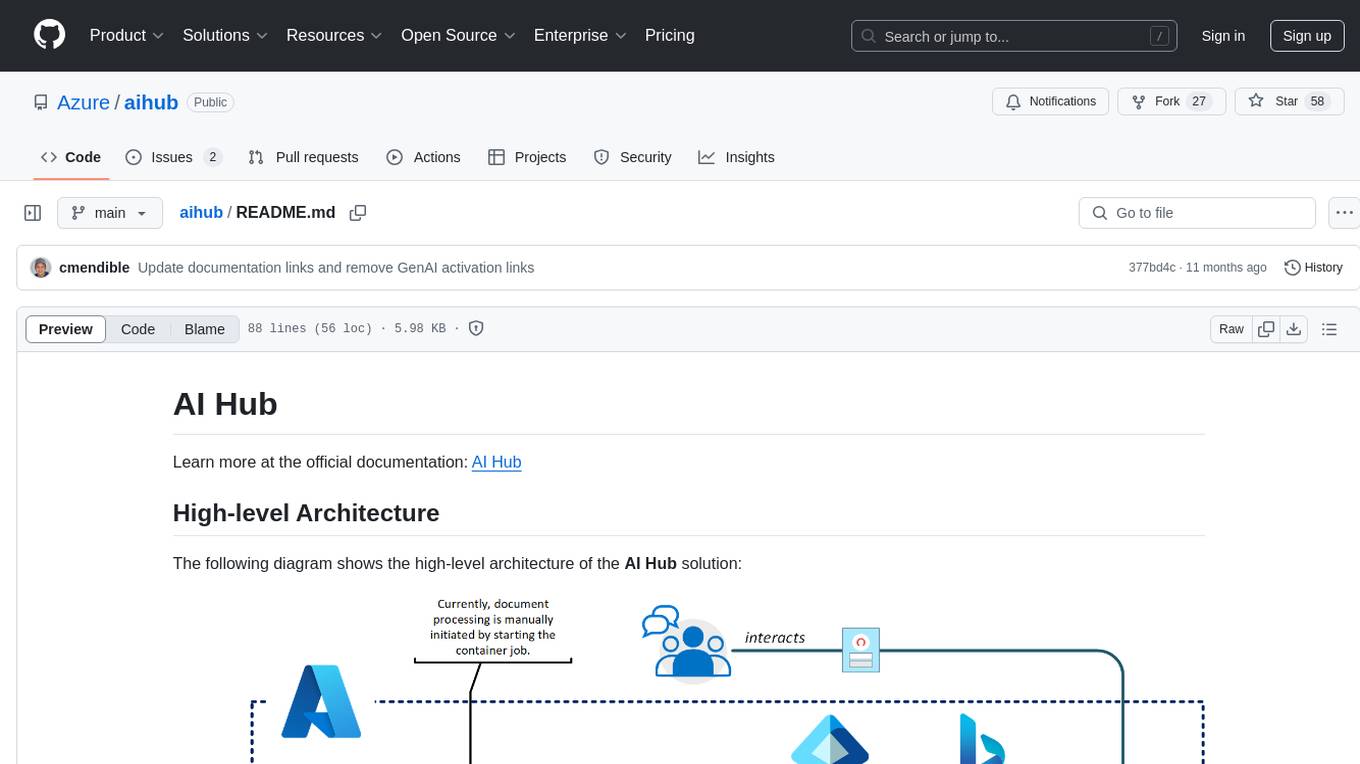
aihub
AI Hub is a comprehensive solution that leverages artificial intelligence and cloud computing to provide functionalities such as document search and retrieval, call center analytics, image analysis, brand reputation analysis, form analysis, document comparison, and content safety moderation. It integrates various Azure services like Cognitive Search, ChatGPT, Azure Vision Services, and Azure Document Intelligence to offer scalable, extensible, and secure AI-powered capabilities for different use cases and scenarios.
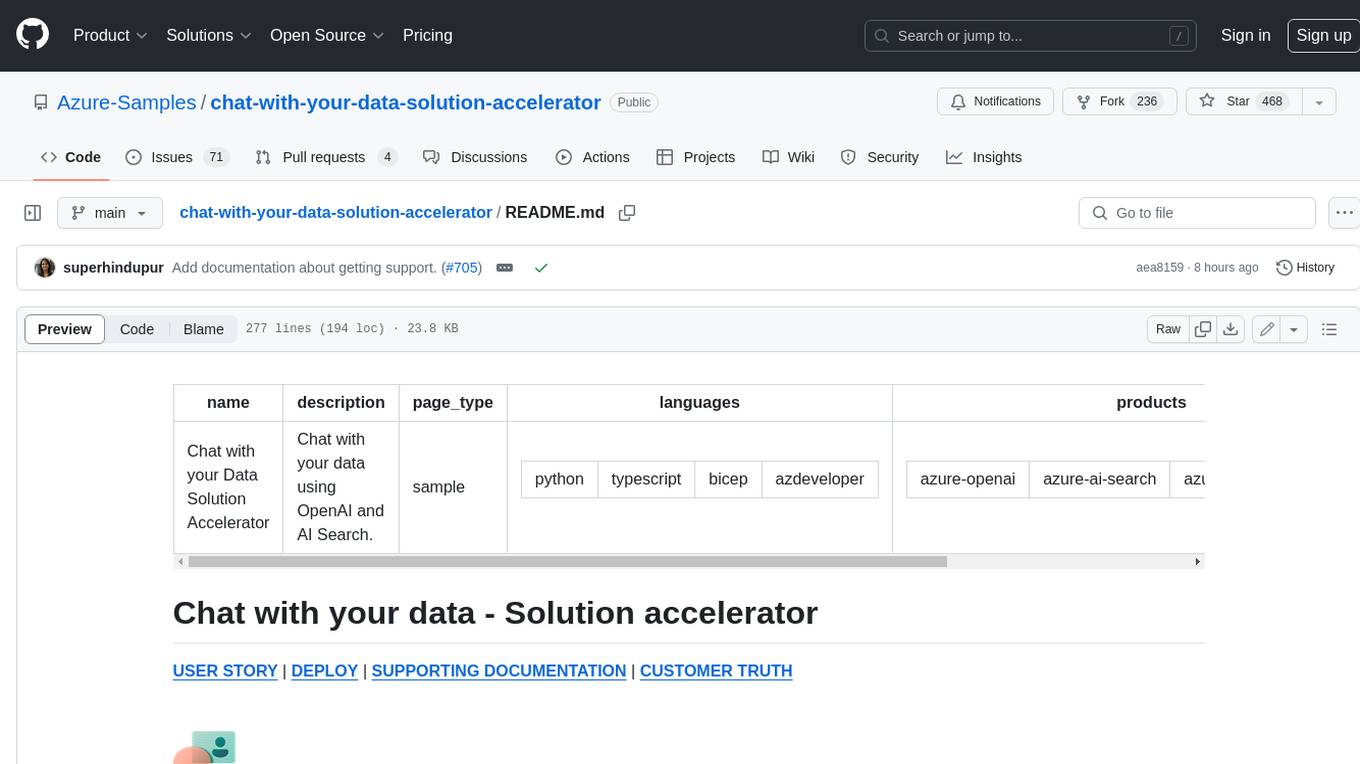
chat-with-your-data-solution-accelerator
Chat with your data using OpenAI and AI Search. This solution accelerator uses an Azure OpenAI GPT model and an Azure AI Search index generated from your data, which is integrated into a web application to provide a natural language interface, including speech-to-text functionality, for search queries. Users can drag and drop files, point to storage, and take care of technical setup to transform documents. There is a web app that users can create in their own subscription with security and authentication.
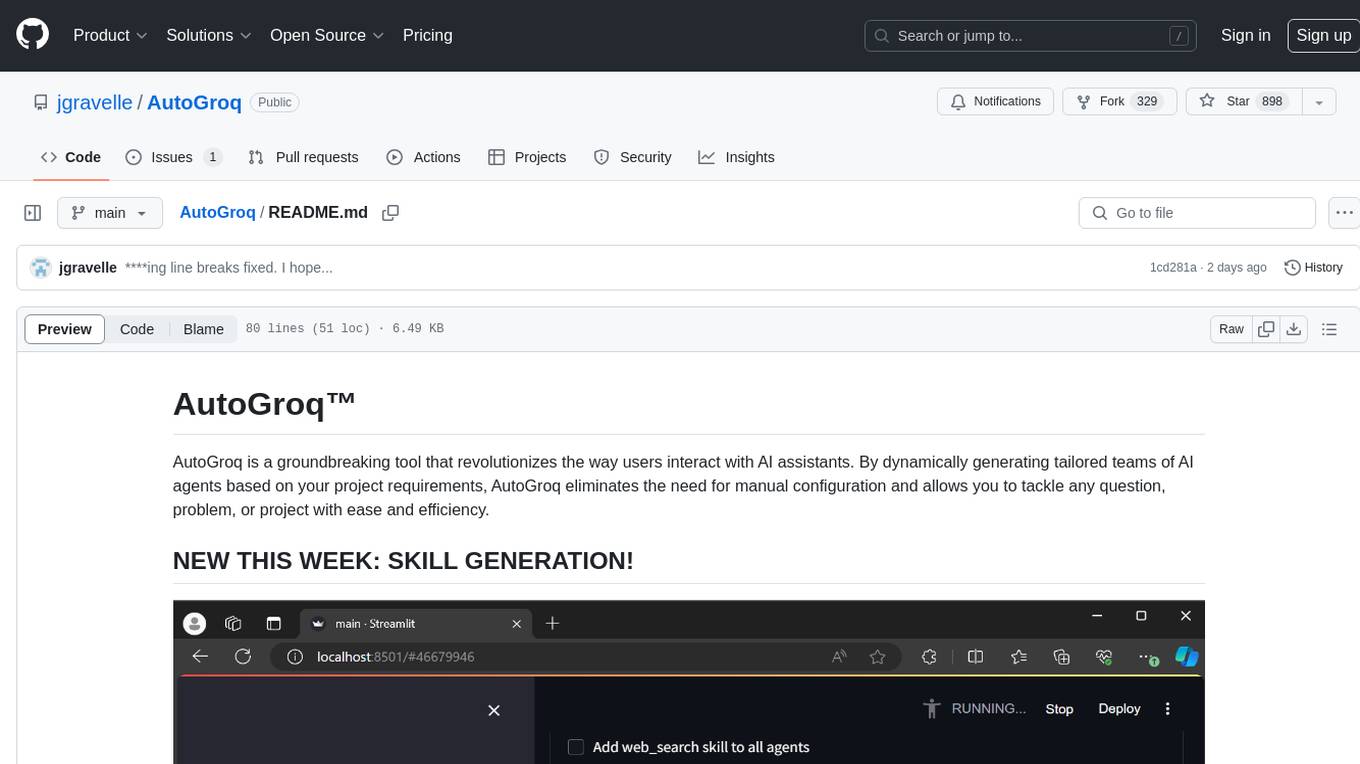
AutoGroq
AutoGroq is a revolutionary tool that dynamically generates tailored teams of AI agents based on project requirements, eliminating manual configuration. It enables users to effortlessly tackle questions, problems, and projects by creating expert agents, workflows, and skillsets with ease and efficiency. With features like natural conversation flow, code snippet extraction, and support for multiple language models, AutoGroq offers a seamless and intuitive AI assistant experience for developers and users.
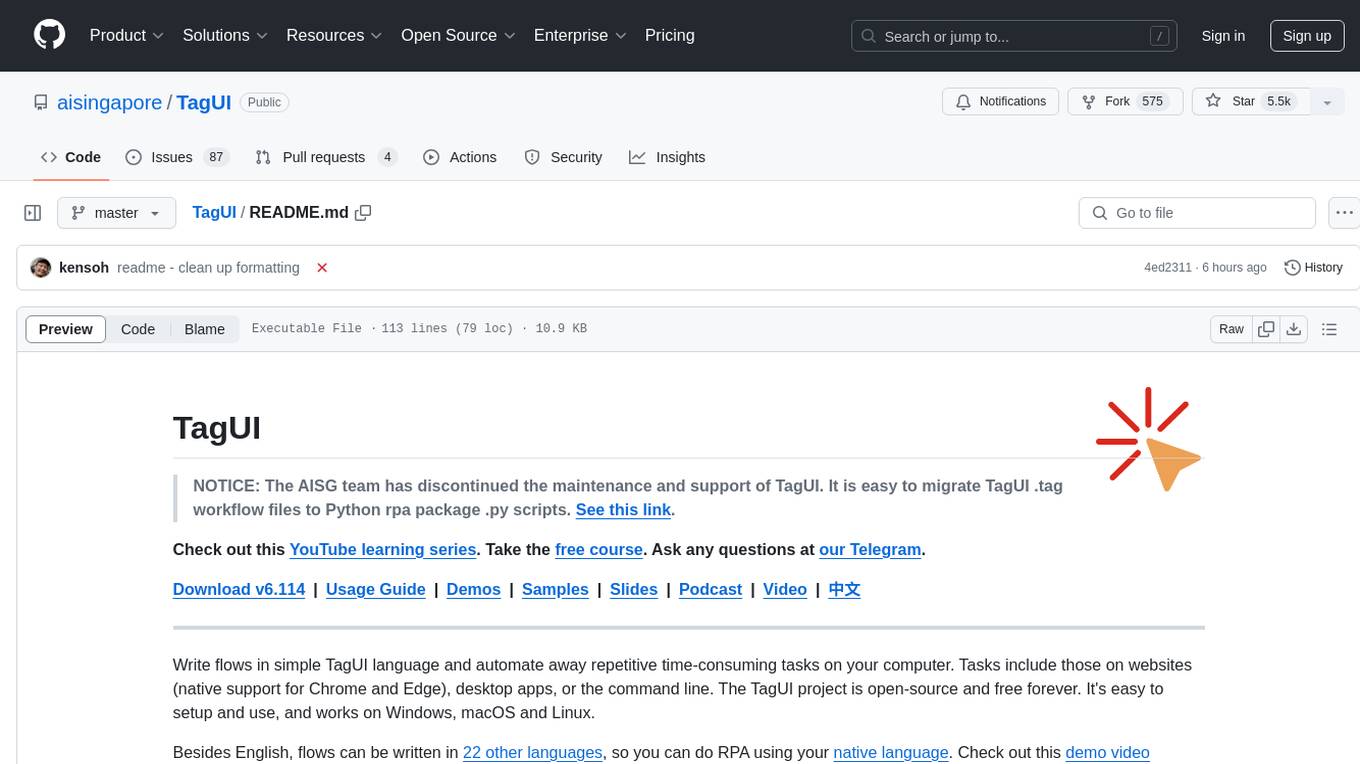
TagUI
TagUI is an open-source RPA tool that allows users to automate repetitive tasks on their computer, including tasks on websites, desktop apps, and the command line. It supports multiple languages and offers features like interacting with identifiers, automating data collection, moving data between TagUI and Excel, and sending Telegram notifications. Users can create RPA robots using MS Office Plug-ins or text editors, run TagUI on the cloud, and integrate with other RPA tools. TagUI prioritizes enterprise security by running on users' computers and not storing data. It offers detailed logs, enterprise installation guides, and support for centralised reporting.
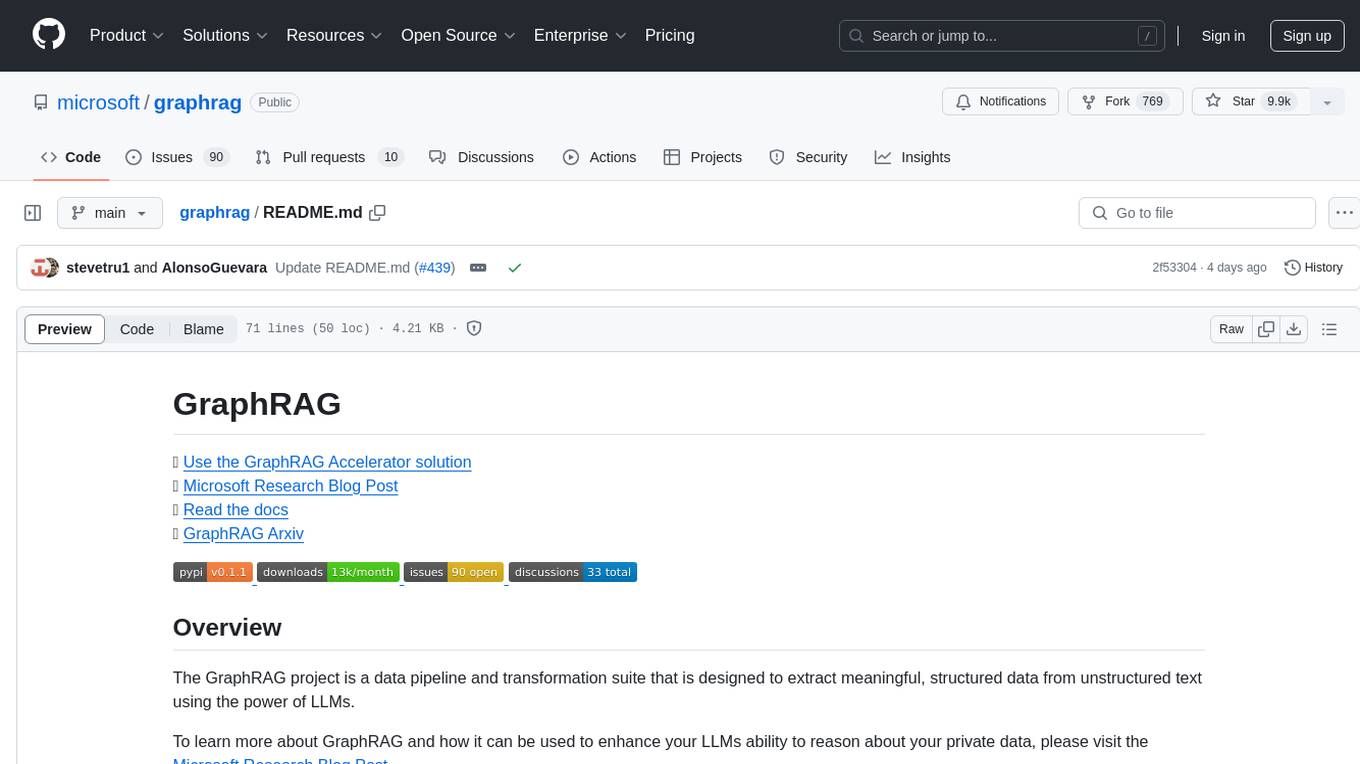
graphrag
The GraphRAG project is a data pipeline and transformation suite designed to extract meaningful, structured data from unstructured text using LLMs. It enhances LLMs' ability to reason about private data. The repository provides guidance on using knowledge graph memory structures to enhance LLM outputs, with a warning about the potential costs of GraphRAG indexing. It offers contribution guidelines, development resources, and encourages prompt tuning for optimal results. The Responsible AI FAQ addresses GraphRAG's capabilities, intended uses, evaluation metrics, limitations, and operational factors for effective and responsible use.
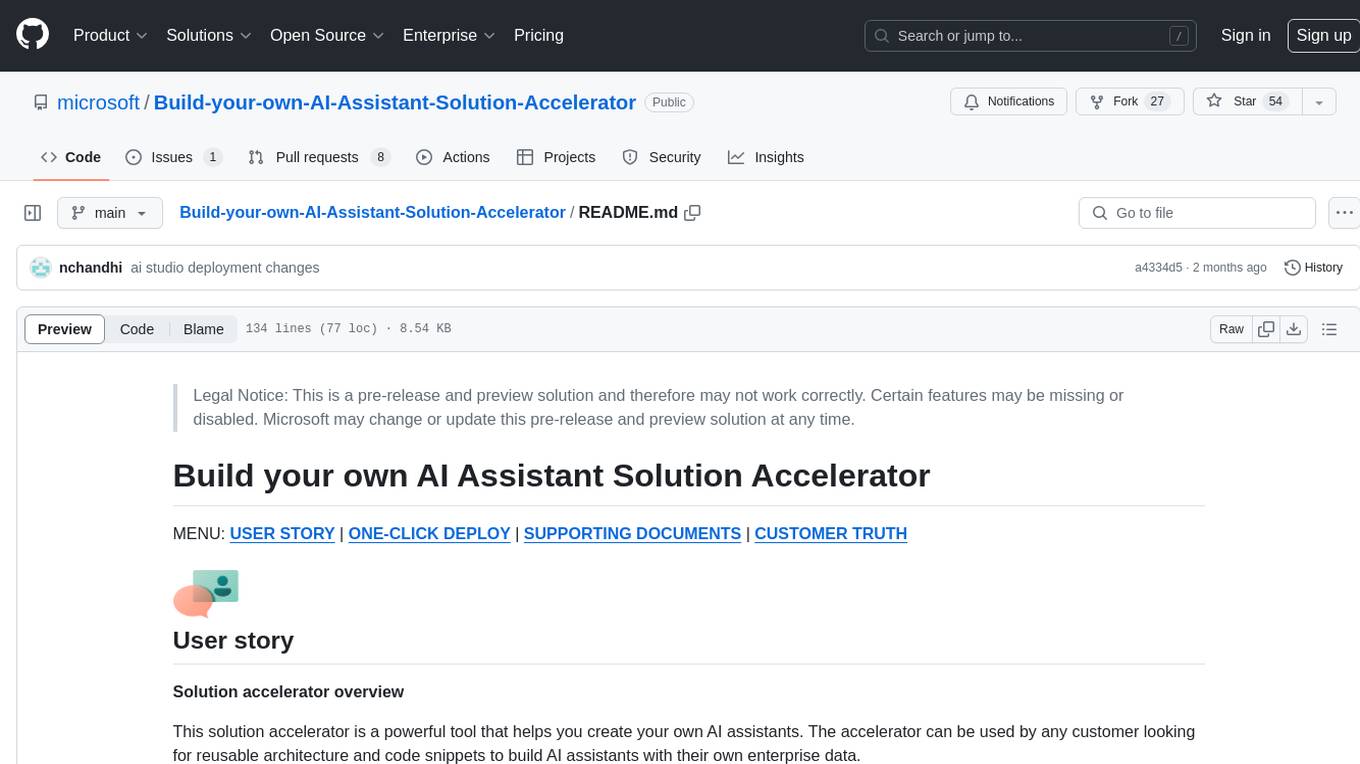
Build-your-own-AI-Assistant-Solution-Accelerator
Build-your-own-AI-Assistant-Solution-Accelerator is a pre-release and preview solution that helps users create their own AI assistants. It leverages Azure Open AI Service, Azure AI Search, and Microsoft Fabric to identify, summarize, and categorize unstructured information. Users can easily find relevant articles and grants, generate grant applications, and export them as PDF or Word documents. The solution accelerator provides reusable architecture and code snippets for building AI assistants with enterprise data. It is designed for researchers looking to explore flu vaccine studies and grants to accelerate grant proposal submissions.
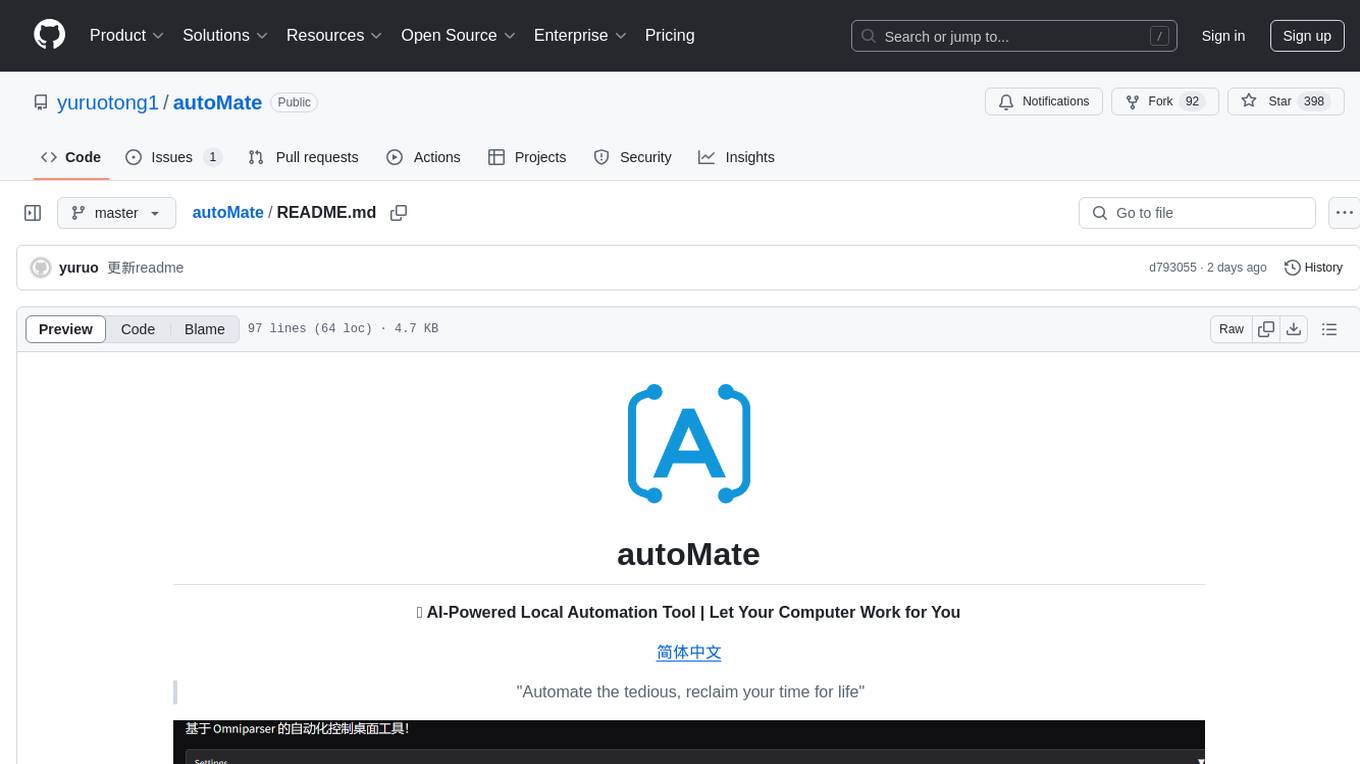
autoMate
autoMate is an AI-powered local automation tool designed to help users automate repetitive tasks and reclaim their time. It leverages AI and RPA technology to operate computer interfaces, understand screen content, make autonomous decisions, and support local deployment for data security. With natural language task descriptions, users can easily automate complex workflows without the need for programming knowledge. The tool aims to transform work by freeing users from mundane activities and allowing them to focus on tasks that truly create value, enhancing efficiency and liberating creativity.
For similar tasks

AnkiGPT
AnkiGPT is a tool that leverages GPT-3.5 or GPT-4 by OpenAI to generate flashcards from lecture slides or text input. Users can easily export the generated flashcards to Anki for effective learning. The tool allows users to edit, delete, and share flashcards, as well as generate mnemonics. AnkiGPT supports nearly all languages and ensures user privacy by not using submitted content for AI training. While powerful, the tool has limitations such as occasional errors in generated flashcards and challenges with mathematical equations. AnkiGPT is designed specifically for Anki flashcard app integration and encourages users to review and verify flashcard information for accuracy.
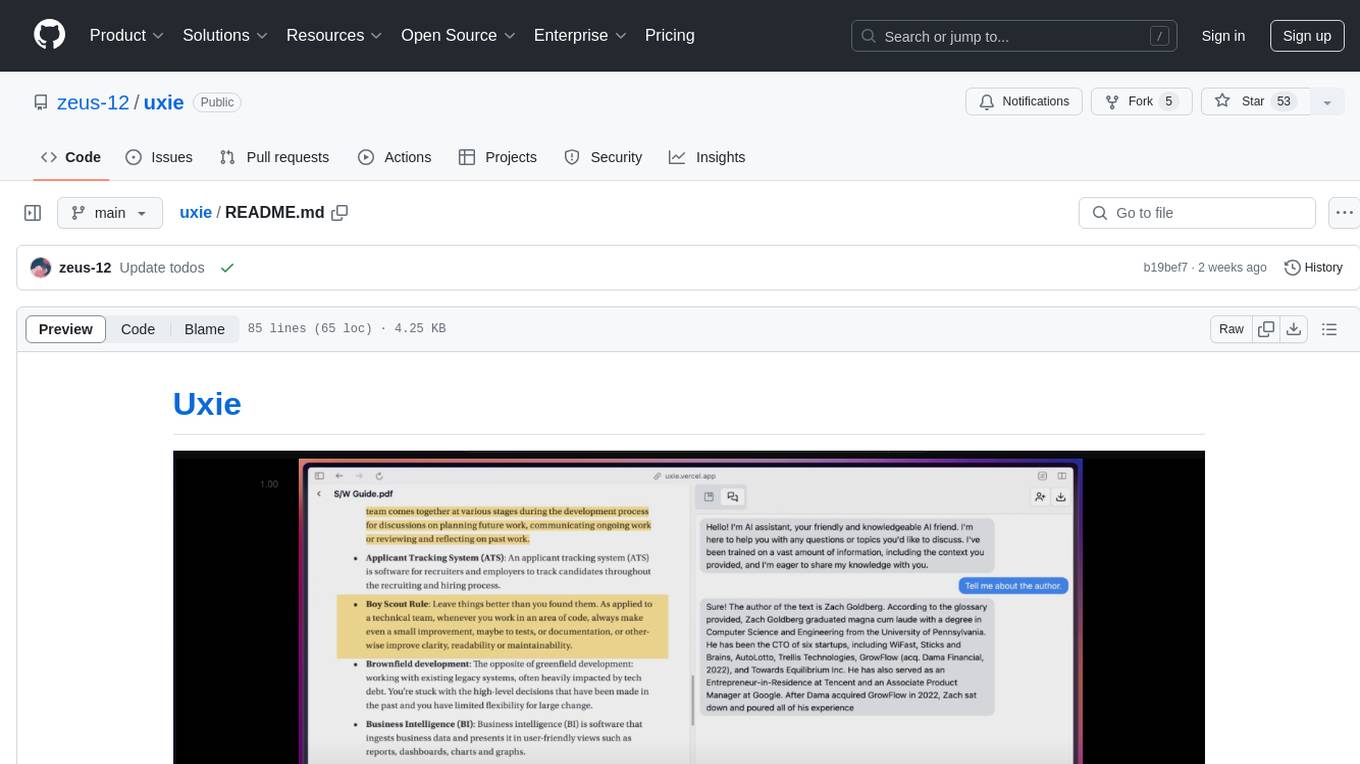
uxie
Uxie is a PDF reader app designed to revolutionize the learning experience. It offers features such as annotation, note-taking, collaboration tools, integration with LLM for enhanced learning, and flashcard generation with LLM feedback. Built using Nextjs, tRPC, Zod, TypeScript, Tailwind CSS, React Query, React Hook Form, Supabase, Prisma, and various other tools. Users can take notes, summarize PDFs, chat and collaborate with others, create custom blocks in the editor, and use AI-powered text autocompletion. The tool allows users to craft simple flashcards, test knowledge, answer questions, and receive instant feedback through AI evaluation.

vocabulary-book-by-deepseek
Vocabulary Book by DeepSeek is a manual for CET-4, postgraduate entrance examination, and TOEFL vocabulary, providing word meanings, roots, example sentences, mnemonic aids, and mnemonic images. The project uses Cline + DeepSeek-R1-16b for over 80% of the code to automatically encode the vocabulary manual. The generated manual includes vocabulary from A to Z for CET-4, CET-6, postgraduate entrance examination, and TOEFL, along with features to generate Anki cards and PDFs. The tool also allows for the creation of mnemonic images for each word and articles.
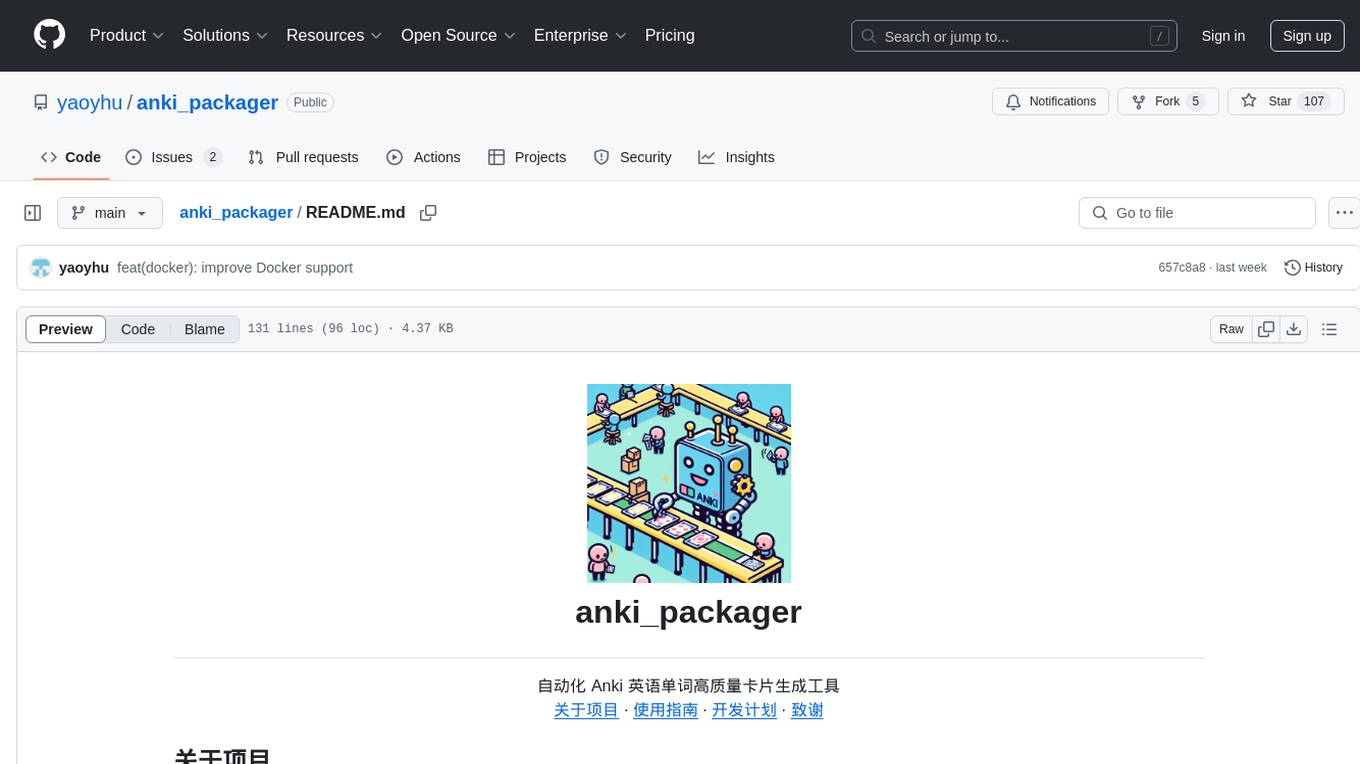
anki_packager
anki_packager is an intelligent tool for generating high-quality Anki flashcards for English vocabulary. It integrates multiple curated dictionaries, provides automated learning experiences, supports various features like Google TTS pronunciation and AI models for word summarization and story generation, offers convenient data import from other sources, ensures a good command-line interface, and can be run using Docker. Each flashcard includes detailed learning resources such as definitions, tenses, AI-generated roots for mnemonic aids, phrases, example sentences, word differentiations, and English explanations with AI-generated stories.
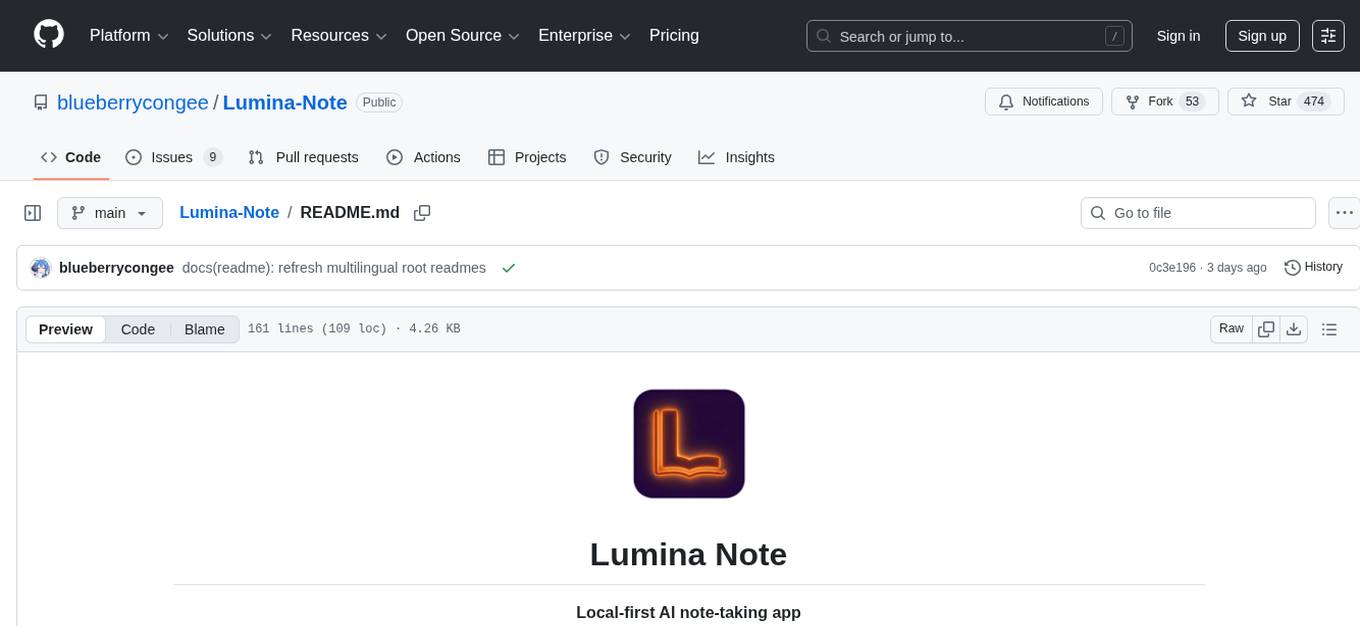
Lumina-Note
Lumina Note is a local-first AI note-taking app designed to help users write, connect, and evolve knowledge with AI capabilities while ensuring data ownership. It offers a knowledge-centered workflow with features like Markdown editor, WikiLinks, and graph view. The app includes AI workspace modes such as Chat, Agent, Deep Research, and Codex, along with support for multiple model providers. Users can benefit from bidirectional links, LaTeX support, graph visualization, PDF reader with annotations, real-time voice input, and plugin ecosystem for extended functionalities. Lumina Note is built on Tauri v2 framework with a tech stack including React 18, TypeScript, Tailwind CSS, and SQLite for vector storage.
For similar jobs

LLMStack
LLMStack is a no-code platform for building generative AI agents, workflows, and chatbots. It allows users to connect their own data, internal tools, and GPT-powered models without any coding experience. LLMStack can be deployed to the cloud or on-premise and can be accessed via HTTP API or triggered from Slack or Discord.

daily-poetry-image
Daily Chinese ancient poetry and AI-generated images powered by Bing DALL-E-3. GitHub Action triggers the process automatically. Poetry is provided by Today's Poem API. The website is built with Astro.

exif-photo-blog
EXIF Photo Blog is a full-stack photo blog application built with Next.js, Vercel, and Postgres. It features built-in authentication, photo upload with EXIF extraction, photo organization by tag, infinite scroll, light/dark mode, automatic OG image generation, a CMD-K menu with photo search, experimental support for AI-generated descriptions, and support for Fujifilm simulations. The application is easy to deploy to Vercel with just a few clicks and can be customized with a variety of environment variables.

SillyTavern
SillyTavern is a user interface you can install on your computer (and Android phones) that allows you to interact with text generation AIs and chat/roleplay with characters you or the community create. SillyTavern is a fork of TavernAI 1.2.8 which is under more active development and has added many major features. At this point, they can be thought of as completely independent programs.

Twitter-Insight-LLM
This project enables you to fetch liked tweets from Twitter (using Selenium), save it to JSON and Excel files, and perform initial data analysis and image captions. This is part of the initial steps for a larger personal project involving Large Language Models (LLMs).

AISuperDomain
Aila Desktop Application is a powerful tool that integrates multiple leading AI models into a single desktop application. It allows users to interact with various AI models simultaneously, providing diverse responses and insights to their inquiries. With its user-friendly interface and customizable features, Aila empowers users to engage with AI seamlessly and efficiently. Whether you're a researcher, student, or professional, Aila can enhance your AI interactions and streamline your workflow.

ChatGPT-On-CS
This project is an intelligent dialogue customer service tool based on a large model, which supports access to platforms such as WeChat, Qianniu, Bilibili, Douyin Enterprise, Douyin, Doudian, Weibo chat, Xiaohongshu professional account operation, Xiaohongshu, Zhihu, etc. You can choose GPT3.5/GPT4.0/ Lazy Treasure Box (more platforms will be supported in the future), which can process text, voice and pictures, and access external resources such as operating systems and the Internet through plug-ins, and support enterprise AI applications customized based on their own knowledge base.

obs-localvocal
LocalVocal is a live-streaming AI assistant plugin for OBS that allows you to transcribe audio speech into text and perform various language processing functions on the text using AI / LLMs (Large Language Models). It's privacy-first, with all data staying on your machine, and requires no GPU, cloud costs, network, or downtime.